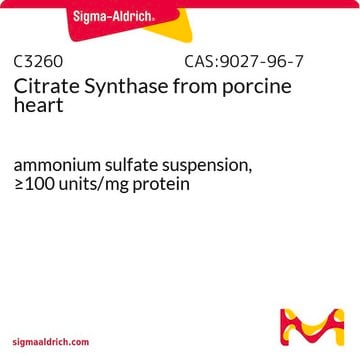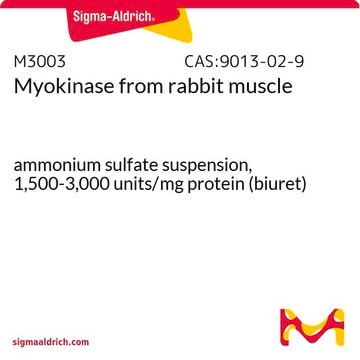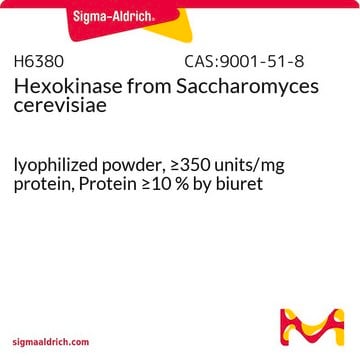SRP6121
AK1 human
recombinant, expressed in E. coli, ≥95% (SDS-PAGE)
Sinónimos:
no change, ATP-AMP phophotransferase, ATP-AMP transphosphorylase 1, Adenylate kinase isoenzyme 1, Adenylate monophosphate kinase, Myokinase
About This Item
Productos recomendados
biological source
human
recombinant
expressed in E. coli
assay
≥95% (SDS-PAGE)
form
liquid
mol wt
23.7 kDa (214 aa, 1-194 aa + NT His Tag)
purified by
chromatography
packaging
pkg of 100 μg
technique(s)
activity assay: suitable
NCBI accession no.
shipped in
dry ice
storage temp.
−70°C
Gene Information
human ... AK1(203)
General description
The gene AK1 (adenylate kinase isoenzyme 1) is mapped to human chromosome 9 on the location 9q34.11. It belongs to the nucleotide monophosphate kinase family. The AK1 protein is found in the cytosol of skeletal muscle, brain, and heart.The structure of AKs (adenylate kinases) comprises of three functional domains: the catalytic and oligomerization regulatory enzyme (CORE) domain, the ligand interaction domain (LID) domain, and the substrate binding site. In human tissues, a total of nine distinct isoenzymes of adenylate kinase are known, namely AK1 to AK9. Recombinant human AK1 protein, fused to His-tag at N-terminus, was expressed in Escherichia coli and purified by using conventional chromatography.
Biochem/physiol Actions
Physical form
Preparation Note
Other Notes
Storage Class
11 - Combustible Solids
wgk_germany
WGK 3
flash_point_f
Not applicable
flash_point_c
Not applicable
Certificados de análisis (COA)
Busque Certificados de análisis (COA) introduciendo el número de lote del producto. Los números de lote se encuentran en la etiqueta del producto después de las palabras «Lot» o «Batch»
¿Ya tiene este producto?
Encuentre la documentación para los productos que ha comprado recientemente en la Biblioteca de documentos.
Nuestro equipo de científicos tiene experiencia en todas las áreas de investigación: Ciencias de la vida, Ciencia de los materiales, Síntesis química, Cromatografía, Analítica y muchas otras.
Póngase en contacto con el Servicio técnico








